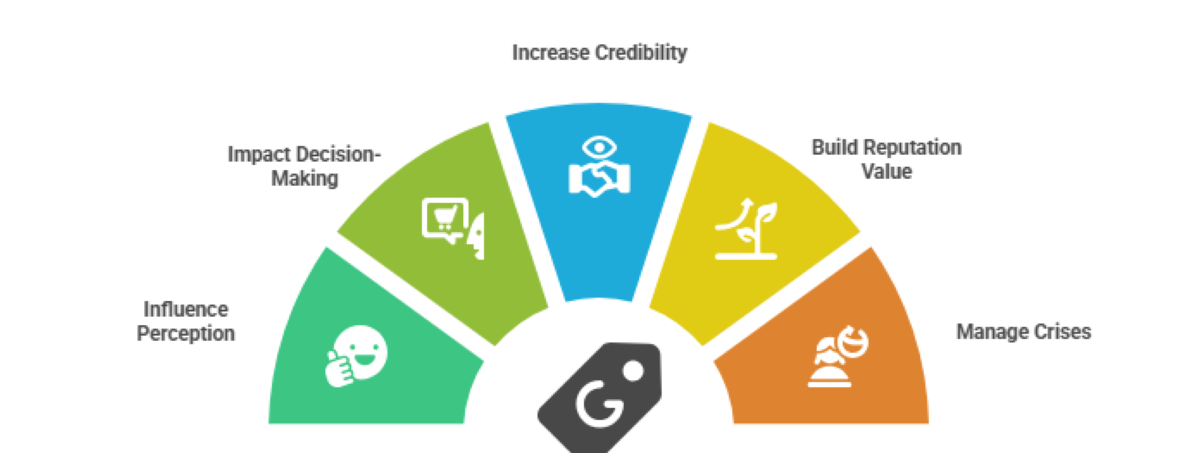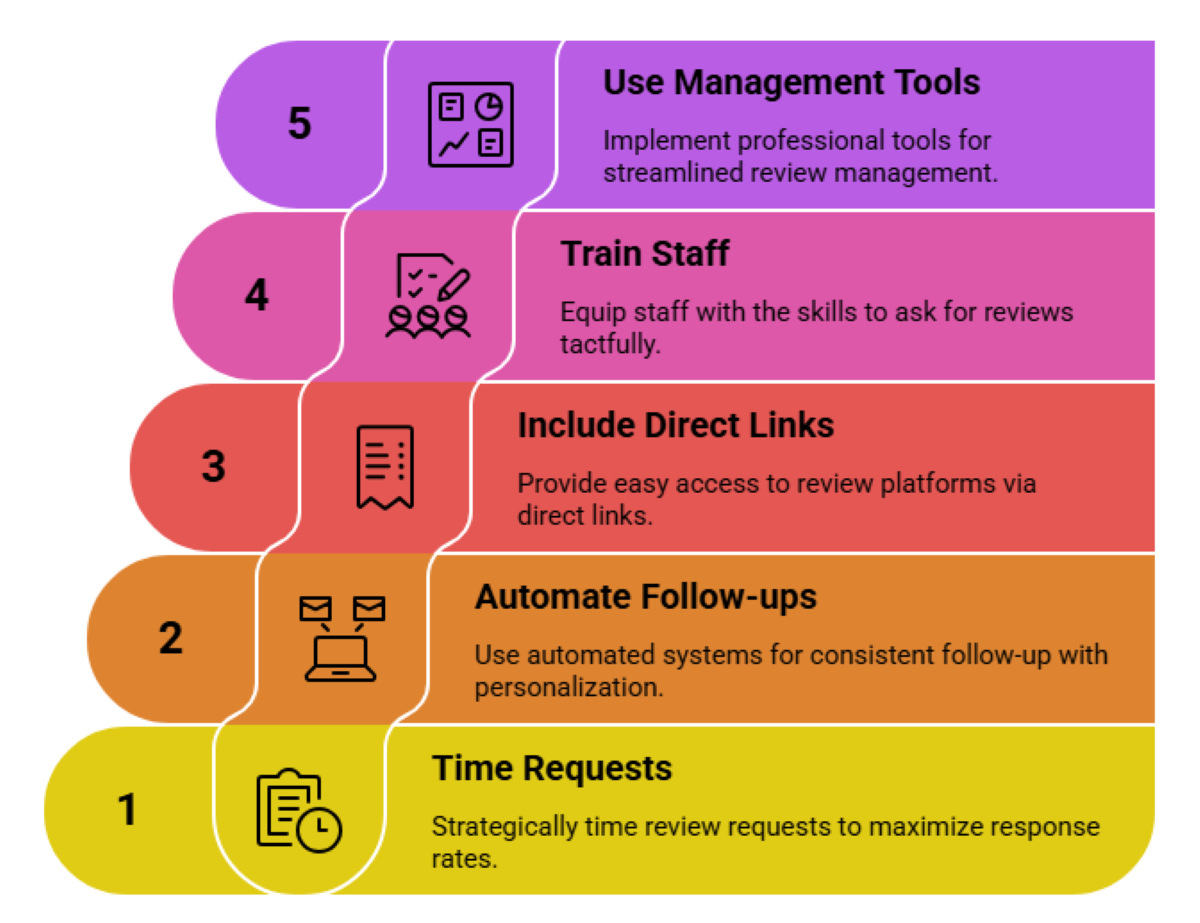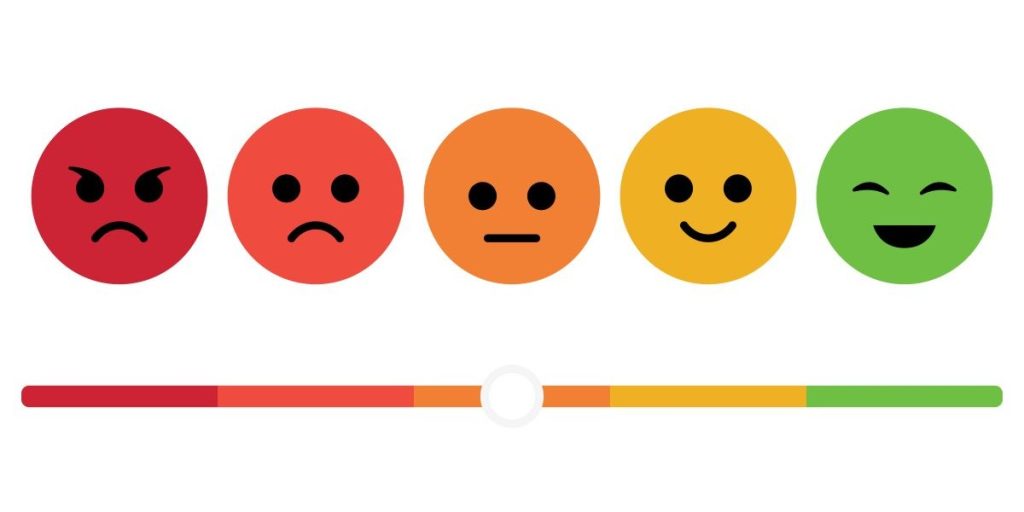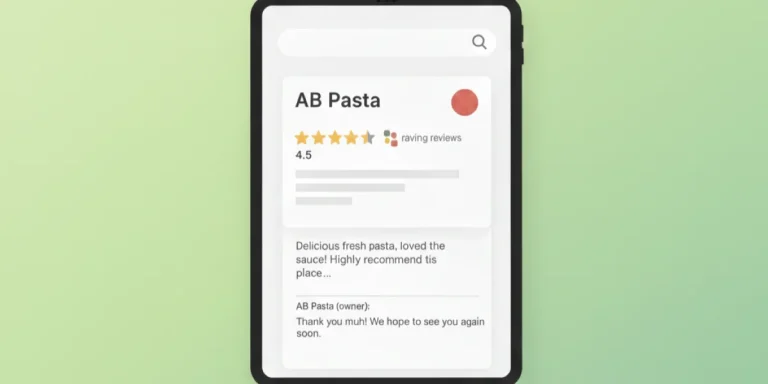
Imagine a potential customer searching for a product or service you offer. What’s the first thing they do? They check the reviews. In today’s digital world, Google reviews are often the deciding factor between choosing your business or your competitor’s. A single positive review can build trust and influence purchasing decisions within seconds, whereas weak or absent reviews send customers elsewhere, fast.
81% of consumers use reviews to evaluate businesses before making purchasing decisions. But here’s what most business owners don’t realize: reviews directly impact how Google ranks your business in local search results. Review signals account for 15% of local pack rankings, those coveted top three spots that appear when someone searches for businesses like yours.
Whether you run a local restaurant, dental practice, or service company, your online reviews determine customer trust and business growth.
What are the Importance of Google reviews?
Google reviews are customer feedback that appears on your Google Business Profile when people search for your business or related services. These reviews combine star ratings from one to five with written comments that describe the customer experience. When someone searches for businesses like yours on Google or Google Maps, your reviews appear prominently alongside your business information. This immediate visibility makes them more influential than reviews on other platforms because they reach customers at the exact moment they’re making decisions.
The role of Google reviews in online reputation

Your potential customers don’t just visit your website; they Google you. Real reviews from real clients help establish trust, validate your services, and turn curious visitors into confident buyers.
Influence perception and trust
Customer reviews directly build trust, with 94% of consumers reporting that positive reviews make them more likely to use a business. When potential customers find your business online, they immediately look for validation through feedback from previous customers. A business with many positive reviews appears more established and reliable than one with few reviews. This trust factor becomes critical for service businesses where customers can’t see the final product before purchasing.
Impact on customer decision-making
Research indicates that consumers typically require a business to have substantial online reviews before they will believe its average star rating. The decision-making process has entirely shifted as customers now research businesses online before visiting or calling. Reviews provide the social proof needed to convert browsers into customers. Strong recent reviews often close the sale before any direct contact happens.
Increase brand credibility
Reviews work as genuine testimonials that carry more weight than your marketing materials. When customers share specific details about their experiences, they create authentic content that connects with future prospects. This real feedback demonstrates transparency and builds credibility that promotional content cannot match.
Build long-term reputation value
Consistent positive reviews create momentum for your business reputation. Each new positive review strengthens your overall brand perception and reduces the impact of occasional negative reviews. This accumulated reputation value becomes a competitive advantage that protects your business and attracts customers consistently.
Manage reputation crises through reviews
When handled correctly, reviews give you opportunities to show excellent customer service publicly. Responding professionally to concerns demonstrates to potential customers that you care about satisfaction and will address problems when they occur.
Google reviews & local SEO: The connection

Review signals are among the most important areas to focus on for improving local rankings, making them essential for local search success.
How do Google reviews affect local map pack rankings?
Google’s algorithm heavily prioritizes review signals when determining which businesses appear in the coveted local three-pack results, making reviews essential for visibility.
- Review count impact: Businesses with substantial review counts rank higher than competitors with fewer reviews, even when other ranking factors are similar.
- Average rating influence: Google favors businesses with 4.0+ star ratings for the local pack inclusion, as higher ratings signal quality and customer satisfaction to algorithms.
- Review frequency matters: Consistent monthly review acquisition signals active business operations to Google, improving local pack ranking potential compared to inactive review profiles.
- Competitor comparison: Google compares your review profile against local competitors, with stronger review signals often determining who appears in the top three positions.
- Local pack prominence: Appearing in the local pack generates significantly more clicks than regular organic listings, making review optimization crucial for visibility.
Quantity, quality, and recency of reviews
Google evaluates multiple review dimensions when ranking local businesses, with each factor contributing differently to your overall local search performance and visibility.
- Minimum review threshold: Businesses need a solid foundation of reviews before Google considers them competitive for local pack rankings in most industries and markets.
- Quality indicators: Detailed reviews with substantial content carry more ranking weight than short reviews, as they provide valuable content for Google’s algorithms.
- Fresh review signals: Recent reviews carry more ranking weight than older reviews, signaling current business activity levels.
- Review diversity: Google values reviews from different customer types and demographics, as this indicates broad appeal and authentic customer engagement patterns.
- Negative review balance: Having some negative reviews actually helps rankings, as 100% positive profiles may appear suspicious to Google’s spam detection systems.
Keywords in reviews as ranking signals
Customer reviews containing relevant business keywords help Google understand your services and improve rankings for specific search terms and local queries.
- Natural keyword inclusion: Reviews mentioning specific services help rank for those exact terms in local searches.
- Location-based keywords: Reviews mentioning your city, neighborhood, or nearby landmarks strengthen geographic relevance signals for location-specific search queries.
- Service-specific mentions: Customers naturally describing your services create keyword-rich content that Google indexes for relevant search terms and industry queries.
- Long-tail keyword benefits: Detailed reviews often contain long-tail keywords that help you rank for specific, high-intent search phrases competitors might miss.
- Semantic keyword relationships: Google understands related terms mentioned in reviews, helping you rank for synonyms and related services beyond exact keywords.
Review velocity and SEO
The rate and consistency of review acquisition signal business health and customer satisfaction levels, directly impacting your local search ranking performance.
- Steady acquisition pattern: Receiving reviews regularly demonstrates consistent customer flow and active business operations to Google’s ranking algorithms.
- Sudden spikes concern: Large numbers of reviews in short periods trigger Google’s spam filters, potentially harming rankings despite positive review content.
- Consistency over quantity: Regular review acquisition over time outranks businesses with review bursts followed by long periods of inactivity.
- Seasonal variation acceptance: Google recognizes natural seasonal patterns in review velocity, allowing for legitimate fluctuations in certain industries like tourism or retail.
- Velocity compared locally: Google compares your review acquisition rate against local competitors, with stronger velocity patterns improving relative ranking positions.
Geographic relevance through local mentions
Reviews containing specific local references strengthen your business’s connection to the community and improve rankings for location-based search queries.
- Neighborhood name mentions: Reviews referencing specific neighborhoods or districts help establish geographic relevance for hyper-local search queries.
- Landmark references: Customers mentioning nearby landmarks, schools, or popular locations in reviews strengthen your local search presence and geographic authority signals.
- Local event connections: Reviews discussing local events, festivals, or community activities demonstrate active participation in the local business community.
- Regional terminology usage: Reviews using local slang, regional terms, or area-specific language help Google understand your authentic connection to the community.
- Public transportation mentions: References to local bus stops, train stations, or transit options in reviews improve rankings for mobility-related local searches.
Benefits of Google reviews for your business
- Builds credibility and trust – Google’s dominant search position makes reviews the most trusted customer feedback platform worldwide.
- Improves local SEO rankings – Strong review profiles appear more frequently in knowledge panels, featured snippets, and search results.
- Drives website visits and calls – Positive reviews create multiple customer touchpoints and increase engagement with business listings significantly.
- Boosts click-through rates – Star ratings displayed in search results help your listing stand out among competitors effectively.
- Provides social proof for conversions – Reviews offer powerful validation during decision-making moments, increasing purchase likelihood dramatically.
Common mistakes businesses make with reviews
- Not asking for reviews – Assuming satisfied customers will automatically leave reviews without prompting leads to negative profile skew.
- Ignoring negative feedback – Unresponded negative reviews signal poor customer service and damage reputation with future customers permanently.
- Using fake or bought reviews – Purchasing artificial reviews violates Google policies and risks serious penalties, including removal.
- Not responding to any reviews – Failing to engage with feedback represents missed opportunities for demonstrating excellent customer service publicly.
- Inconsistent review management – Sporadic attention creates reputation gaps and suggests unreliable business operations to potential customers.
How to get more Google reviews?

Building a sustainable review acquisition strategy requires understanding customer psychology and implementing systematic approaches that feel natural rather than pushy.
Time your review requests strategically
Timing your review requests strategically increases response rates and ensures positive experiences remain fresh in customers’ minds. The optimal moment varies by business type, as restaurants should ask immediately after dining, while service businesses might wait a day or two for customers to fully appreciate results.
Use email/SMS automation
Automated systems ensure consistent follow-up without requiring manual effort for each customer interaction. However, personalization remains important even in automated messages to maintain authenticity and increase response rates. Professional tools can streamline this process while maintaining a personal touch.
Include links in receipts, emails, or on your site
Making the review process simple removes friction that prevents customers from following through. Direct links to your Google Business Profile’s review section eliminate the need for customers to search for your business manually. QR codes on receipts or business cards provide convenient mobile access.
Train staff to ask tactfully
Your team represents your first opportunity for review acquisition, but they need proper training to ask for reviews naturally and appropriately. Staff should understand when and how to make requests without being pushy or interrupting the customer experience. Practice scenarios help team members develop comfortable approaches.
Use professional review management tools
Professional review management tools streamline the entire process while providing analytics and automation features that individual businesses cannot achieve manually. These platforms often include templates, scheduling features, and integration with existing customer management systems.
How to respond to Google reviews (positive & negative)?
Responding to Google reviews builds trust, improves your online reputation, and shows customers you value their feedback. Proper responses can turn critics into advocates and encourage more positive engagement.
Responding to positive reviews
Thank customers genuinely – Express sincere appreciation for their time and feedback. Use their name when possible and mention specific details from their review to show you read it carefully.
Keep responses concise – A brief, heartfelt thank you message works best. Avoid overly lengthy responses that might seem insincere or automated. Two to three sentences typically suffice for positive reviews.
Encourage future visits – Invite satisfied customers to return or try other services. Mention upcoming promotions, new products, or seasonal offerings to maintain their interest and engagement with your business.
Responding to negative reviews
Always stay professional – Never respond defensively or emotionally, regardless of how unfair the criticism seems. Maintain a calm, courteous tone that reflects your business values and commitment to resolution.
Acknowledge the issue – Accept responsibility where appropriate and validate the customer’s feelings. Even if you disagree, showing empathy demonstrates professionalism and genuine concern for customer experiences and satisfaction.
Offer solutions publicly – Address the specific problem mentioned and outline steps you’ll take to resolve it. This shows other potential customers how you handle issues professionally and proactively.
Google reviews in 2025: What’s new?

The review system continues advancing as Google introduces new features and algorithms designed to improve user experience and combat manipulation.
AI-generated review summaries on Google Business Profiles
Google has begun testing AI-powered review summaries that highlight common themes and sentiments across multiple reviews. These summaries help potential customers quickly understand the overall customer experience without reading individual reviews. Businesses should focus on encouraging detailed, specific feedback that will contribute positively to these automated summaries.
Impact of video/image reviews
Visual reviews carry increasing weight as customers seek more authentic, detailed feedback about products and services. Encouraging customers to include photos or videos with their reviews provides social proof while helping your business stand out in search results. Visual content also tends to receive higher engagement and appears more trustworthy to potential customers.
More emphasis on real-time feedback and local authenticity
Google increasingly prioritizes recent, locally relevant reviews that demonstrate ongoing business activity and community engagement. This trend emphasizes the importance of consistent review acquisition and genuine local customer relationships rather than one-time review campaigns or artificial manipulation.
User transparency and anti-fake review measures by Google
Google continues strengthening its fake review detection systems and increasing transparency around reviewer identity and history. These measures protect genuine businesses while making it increasingly difficult for competitors or review farms to manipulate ratings artificially.
Integration with other Google services
Reviews are becoming more integrated across Google’s ecosystem, appearing in Google Shopping, Google Ads, and other services. This integration increases the importance of maintaining strong review profiles across all touchpoints where customers might encounter your business.
A quick sneak peek into the 7 best AI review management tools
Managing Google reviews effectively requires the right tools. Here are seven leading platforms that can transform your review management strategy:
Trustpilot
Trustpilot offers multi-platform review collection with advanced analytics, fraud detection, and e-commerce integrations. The platform emphasizes transparency and consumer trust, making it best for businesses building a global reputation across multiple trusted review platforms and online retailers.
Spreadical
Spreadical provides AI-powered WhatsApp integration for natural review management without complex dashboards. Features automated responses, real-time monitoring, and AI-suggested replies that learn your brand tone. Perfect for local businesses preferring personal communication over traditional management platforms.
Birdeye
Birdeye delivers a comprehensive AI-powered platform serving 150,000+ businesses with unified communication, social media management, and multi-location support. Offers automated responses, competitive benchmarking, and integration with 3,000+ applications, making it ideal for enterprise-level reputation management needs.
Podium
Podium focuses on AI-driven lead generation through text messaging, converting website visitors to conversations while managing reviews. Features webchat conversion, automated review requests, and text-to-pay functionality. Ideal for businesses prioritizing personal customer relationships and immediate response capabilities.
NiceJob
NiceJob combines reputation marketing with referral generation, creating customer stories with visual content and automated social media posting. Offers website building services and integrates with 1,000+ business applications. Perfect for service businesses wanting integrated review and marketing solutions.
Yotpo
Yotpo operates as an e-commerce retention platform combining product and business reviews with email marketing, SMS, and loyalty programs. Features visual user-generated content galleries and advanced segmentation capabilities. Best for online retailers with physical locations needing integrated marketing campaigns.
Reputation.com
Reputation.com provides an enterprise-grade platform with AI-powered insights, comprehensive analytics, and multi-platform monitoring across 150+ review sites. Features automated listings management, customer experience surveys, and competitive benchmarking. Ideal for established businesses with multiple locations and complex reputation needs.
Learn more about these tools from our blog: Top 7 Google Review Management Tools for Small Businesses
Frequently asked questions
Why are Google reviews important for small businesses?
Reviews level the playing field for small businesses by providing credibility and visibility that can compete with larger companies. They’re often the deciding factor for local customers choosing between similar services.
Do reviews really affect my Google ranking?
Yes, according to Moz’s local search ranking factors study, review signals account for approximately 15% of local SEO ranking factors. Both the quantity and quality of reviews directly impact your visibility in local search results.
How many reviews should I aim for?
While there’s no magic number, focus on consistent acquisition rather than on hitting specific targets. Building a steady stream of authentic reviews over time proves more valuable than pursuing arbitrary quantities.
Can I delete a bad Google review?
You can’t delete legitimate negative reviews, but you can flag reviews that violate Google’s policies. The best approach is responding professionally and addressing concerns constructively.
What’s the best way to ask customers for a review?
Ask at the peak of customer satisfaction immediately after a positive experience or successful service completion. Make the process simple with direct links and clear instructions.
How often should I respond to reviews?
Respond to all reviews within 24-48 hours when possible. Consistent engagement shows active management and respect for customer feedback.
Is it OK to offer incentives for reviews?
Google prohibits incentivizing reviews with discounts or rewards. Focus on providing excellent service and asking satisfied customers naturally rather than offering compensation.
Can I use automation to manage reviews?
Yes, automation tools can streamline monitoring, notifications, and follow-up processes. However, responses should remain personal and authentic rather than completely automated.
Do keywords in reviews help SEO?
When customers naturally mention relevant services or products in reviews, these keywords can help Google understand your business relevance for related searches.
Are Google reviews more important than other platforms?
Google reviews typically carry the most weight due to their integration with search results and Google Maps. However, industry-specific platforms may also be important depending on your business type.


